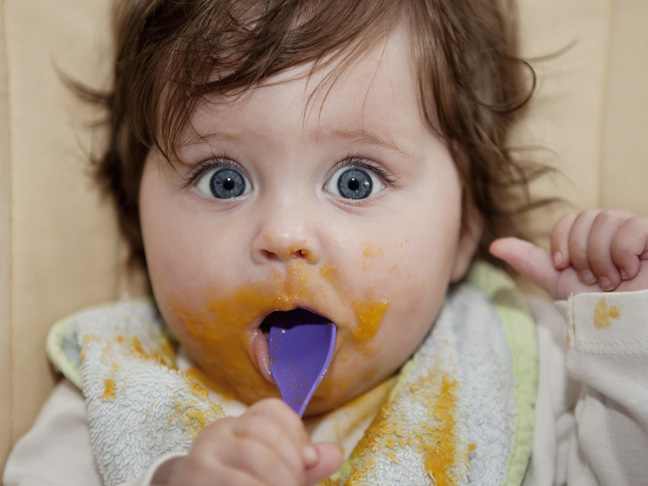In Bradford-on-Avon, the local children’s centre offers a weaning course for 3-month-olds. Wait … what?! Weaning at three months? I mean, aren’t midwives supposed to promote breast feeding? In the states, I was encouraged to breastfeed my daughter for at least a year, so this shocked me. Once my consternation faded I scoffed at the idea, vowing to boycott such a premature endeavor. But then a friend explained that the NHS’s interpretation of weaning wasn’t as black-and-white as my own, more American, definition.
Help me out here, mamas of America: Doesn’t ‘weaning’ pretty much mean eliminating breast feeding? Even the dictionary defines it as losing the need to suckle. Well, on this side of the pond, weaning just means ‘introducing solids’, and the NHS course is more of a preparatory measure for when your kid starts chompin’ at around six months. In which case — great — sign me up!
Considering I’ve already weaned one baby, you might assume I know how to do it but, like many second-time moms, I’ve forgotten virtually everything about milestones and how the hell I’m supposed to nurture them. Besides, I wanted to know if they did things differently in the UK.
Yes, the plucky midwife who led our small group had lots of advice (distributed in game show format complete with laminated pictures, lest we get bored). Huddled round the cozy, brightly colored room at the Children’s Centre, two other moms with chubby babies and I got the lowdown. There was a lot of good information, but some of it varied from US guidelines. Want a few highlights?
In the US, I was told babies should not have eggs until 12 months (they’re a big allergy-trigger). But in the UK, as long as the egg is cooked-through, babies can basically have it whenever.
I remember making Cuisinart-fuls of glop in Brooklyn when my daughter was first eating solids. In England, however, not so much. Guidelines have changed, and word on the street is that babies like texture.
Unfortunately I’d already bought a box of baby cereal when the midwife told me to skip it. To be fair, they still sell powdered cereals in the stores, so I’m sure some British still use it, but at our info session we were told it’s too bland.
A lot of the information felt like common sense — she specifically told us babies shouldn’t have rusks or squash (in America, that pretty much translates to biscotti and Kool Aid) — but it was nice to be reminded not to cook with salt, not to give baby solids before 17-weeks when their organs aren’t ready, and to start in on a vitamin D supplement. Oh, and peanut butter is no longer on the no-no list for under-ones (assuming your child is not allergy-prone).
Confidence renewed, I left the class with determination and an eagerness to satiate the beast that my son was becoming. At 5-and-a-half months, she said Harvey was ready. That night, we plopped him in the Bumbo and kicked off Solids 101 with a dollop of smashed butternut squash. His first response was a startled gag, but after another bite he was hooked. He loved it, he really did.…
But I wish the midwife had prepared me for the feeling in my gut that followed. There was a tension in the pit of my stomach — you know, a melancholy, sort of heartbroken feeling. I guess that’s what happens when you realize your baby is another step closer to growing up.
Photo: Getty








